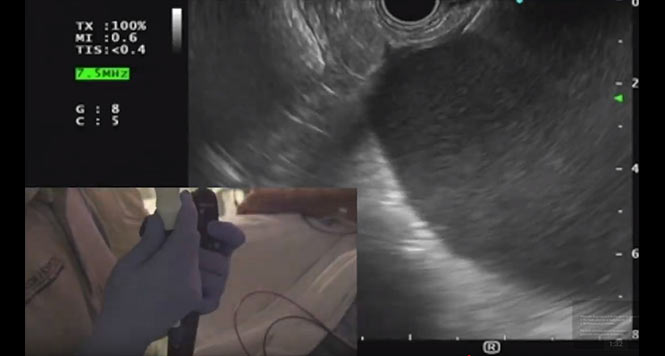EUS-RFA Is Highly Effective in the Treatment of Sporadic Pancreatic Insulinomas With Fewer Adverse Events Compared to Surgery
Rajesh N. Keswani, MD, MS, reviewing Crinò SF, et al. Clin Gastroenterol Hepatol 2023 Mar 3.
Sporadic pancreatic insulinomas (PIs) are challenging lesions with low oncologic risk but a high symptom burden. Despite their low malignant risk, the debilitating symptoms of hypoglycemia have traditionally necessitated surgery via radical resection (eg, Whipple or distal pancreatectomy) or enucleation (removal of only the lesion, leaving the remainder of the organ intact). However, both types of surgery are associated with significant adverse event rates. Thus, there is growing interest in an endoscopic approach to managing these uncommon lesions. Previous small studies have suggested that radiofrequency ablation (RFA) via endoscopic ultrasound (EUS) is safe and effective, but until now, this intervention has not been robustly compared to surgery.
In this multicenter study, the authors identified 178 propensity score-matched patients with PIs managed by surgery (89 patients) and EUS-RFA (89 patients). Propensity score matching was performed to limit the differences in covariates between the two groups (ie, larger lesion size or shorter distance from the pancreatic duct). The authors found, in this retrospective analysis, that EUS-RFA was associated with fewer overall (18.0% vs 61.8%; P<.001) and severe (0% vs 7.8%; P=.0002) adverse events (AEs) than surgery. The most common EUS-RFA AE was pancreatitis (10.1%); in the surgery group, the most common AE was a postoperative pancreatic fistula (42.7%).
Additionally, EUS-RFA and surgery were both found to be efficacious. Nearly all patients (95.5%) who underwent EUS-RFA had symptom relief at the latest follow-up; however, 16.9% required an additional EUS-RFA treatment for symptom relapse. Only 4 of 89 patients who received EUS-RFA ultimately underwent surgery for persistent or recurrent symptoms. As expected, all recipients of primary surgery experienced durable symptom relief at the latest follow-up.

COMMENTThis well-conducted cohort study of patients undergoing EUS-RFA or surgery for PIs provides strong evidence that EUS-RFA is a safe treatment when performed by experienced endosonographers. Furthermore, follow up of patients suggests that EUS-RFA appears to be effective in symptom control, with symptom relapses most frequently managed successfully by repeat EUS-RFA. Although these findings need to be confirmed in a randomized controlled trial, the feasibility of such a trial is unclear for this relatively uncommon condition. In the meantime, this study supports the use of EUS-RFA in sporadic PIs as an acceptable treatment option.
Note to readers: At the time we reviewed this paper, its publisher noted that it was not in final form and that subsequent changes might be made.
CITATION(S)
Crinò SF, Napoleon B, Facciorusso A, et al. Endoscopic ultrasound-guided radiofrequency ablation versus surgical resection for treatment of pancreatic insulinoma. Clin Gastroenterol Hepatol 2023 Mar 3. (Epub ahead of print) (https://doi.org/10.1016/j.cgh.2023.02.022)


